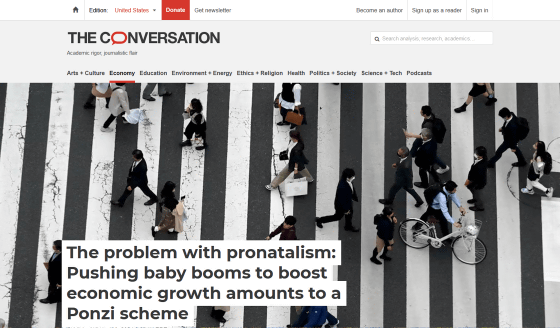Pointing out that aiming for 'increased birth rate' to promote economic growth is the same as a pyramid scheme

In recent years, declining birth rates have become a major problem in developed countries, and each country is promoting policies to increase birth rates. In Silicon Valley,
The problem with pronatalism: Pushing baby booms to boost economic growth amounts to a Ponzi scheme
https://theconversation.com/the-problem-with-pronatalism-pushing-baby-booms-to-boost-economic-growth-amounts-to-a-ponzi-scheme-235725

Countries in Europe and East Asia that are suffering from declining birth rates have adopted 'natalist policies' such as tax breaks for couples with children, housing allowances, and subsidies for infertility treatment. This is based on the expectation that 'if the birth rate improves and the trend of a declining birthrate and aging population is reversed, problems such as economic stagnation and increasing social security burdens should be resolved.'
However, Brown and his colleagues criticize policies that seek to increase fertility rates, stating, 'As demographers and population experts, we know that such efforts are generally unnecessary. Manipulating fertility rates is an inefficient means of solving social, economic, and environmental problems that are almost always better addressed more directly through regulation and redistribution.'
Brown and others criticize the promotion of nativism for the sake of economic growth as misguided, because 'without direct state intervention, the wealth generated by economic growth due to population growth will go to the already wealthy .'
While the additional workers and consumers from population growth may contribute to increased overall wealth, that wealth is absorbed by the already wealthy. In this light, natalist policies are like a pyramid scheme that relies on new entrants to generate returns for early investors.

Another problem is that pronatalist policies tend to lead to government intervention in reproductive behavior. In the past, countries where population growth became a social problem often used active contraception and abortion promotion as a means of population control. The most prominent example of this is China's
In countries that once used contraception and abortion as a means of population control, they tend to adopt the method of 'restricting access to contraception and abortion' when they aim to increase the birth rate. In fact, Brown and his colleagues point out that countries that have adopted policies restricting access to contraception and abortion have a history of promoting contraception and abortion in order to reduce birth rates.
In South Korea, abortion and sterilization were widely encouraged in the 1960s and 1980s, but the government began to ban abortion in the mid-2000s. In the 2010s, social movements to change the situation in which abortion was illegal became active, and in 2019, a ruling was made that the criminal law banning abortion was unconstitutional.
At the 1968 International Conference on Human Rights , it was declared that couples have the right to decide how many children they will have and how often they will space them. If humans have a right to control their reproductive behavior, Brown and his colleagues argue, then governments should protect that right during periods of low as well as high fertility, and policymakers should not interfere with reproductive behavior in order to achieve economic or social goals.

Brown et al. argue that support for families with children should not be provided with the aim of increasing birth rates, saying, 'Governments provide education, contraception, and other health services, not because they will lower birth rates, but because they are essential elements of a progressive and just society. And they provide parental leave, child tax credits, and quality child care, not because they will increase birth rates, but because they give children the best possible start in life.'
'From this perspective, natalism makes the empty promise that simply increasing the population will solve the social and economic problems facing people today. But it's like borrowing from the future to repay a debt from the past,' he said, criticizing the aim of increasing birth rates in order to promote economic growth.
Related Posts:
in Note, Posted by log1h_ik






